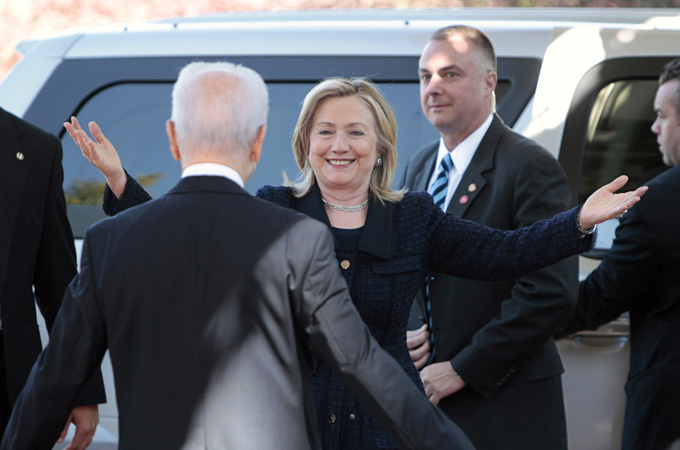Middle East talks to continue
US peace envoy reveals no indication of progress after second day of direct Netanyahu-Abbas talks.

 |
| Clinton arrives in Jerusalem to continue talks and meet Peres and other Israeli politicians [Reuters] |
At the end of the second day of direct Middle East talks, the US special envoy to the region has said that Israeli and Palestinian leaders are putting the tough issues up front in the current round of talks.
But George Mitchell did not give any details on Wednesday on what was achieved during the meetings held over two days in locations in Egypt and Israel. He said the US would continue to place a sustained role in the negotiations.
With US mediation, Benjamin Netanyahu and Mahmoud Abbas will resume the talks next week in Jerusalem.
Hillary Clinton, the US secretary of state, will be looking to bridge the divide over Jewish settlement building when those the talks resume.
The Palestinians have warned that they will walk out of talks if a freeze on settlement construction, which is set to expire at the end of the month, is not extended. But Netanyahu had suggested that some building curbs will be lifted.
‘Serious discussion’
Mitchell said on Tuesday that Israeli and Palestinian leaders “began a serious discussion on core issues”.
These are Israel’s security, the borders of a future Palestinian state, the fate of Palestinian refugees and the future of Jerusalem, but he did not identify the subjects discussed.
| in depth | |||||||||||||
|
Al Jazeera’s Nour Odeh, reporting from Ramallah, said that as far as the Americans are concerned, talks about peace were a must: “Many Palestinian officials tell us off the record that no American administration would allow these talks to fail so early in the process.”
Tuesday’s talks were also expected to tackle the agenda for the negotiations, with Netanyahu reportedly wanting first to address future security arrangements and secure Palestinian recognition of Israel as a Jewish state.
But the Palestinians want first to define the borders of a future Palestinian state, address the status of Jerusalem and discuss the right of return of refugees who were driven out of Palestine in 1948.
Besides the talks in Jerusalem on Wednesday with Netanyahu and Abbas, Clinton is due to meet Shimon Peres, the Israeli president, and Avigdor Lieberman, the foreign minister, as well as Salam Fayyad, the Palestinian prime minister.
Mitchell, meanwhile, is due to hold talks with Bashar al-Assad, the Syrian president, in Damascus on Thursday, the US embassy there confirmed. US officials attending the peace talks said Mitchell would then travel to Lebanon for talks with top officials.
Hamas missing
But the important regional player that is not being engaged in these series of talks is Hamas, the Palestinian movement that controls the Gaza Strip.
Hamas has opposed the talks and insists that Abbas does not have the right to negotiate on behalf of Palestinians. Ahmed Yousef, Hamas’ deputy foreign minister, previously told Al Jazeera that the Palestinians were not behind Abbas.
“The negotiations that the Palestinian people have tried for over two decades are pointless negotiations, the Palestinian people never gained anything from them except the loss of their cause and their rights,” Ismail Rudwan, a Hamas official, said earlier this month.
Larbi Sadiki, author and lecturer at the University of Exeter, argues that “sidelining Hamas in any process to craft genuine peace between Israelis and Palestinians is a glaring omission tantamount to ignoring an elephant in the room”.
“Hamas has reached to willing interlocutors overseas from Moscow to Oslo,” Sadiki wrote recently, hightlighting the willingness of the Palestinian movement to engage politically.
Prominent Israelis such as Efraim Halevy, the former director of Mossad, the Israeli secret service, and Giora Eiland, a former head of Israel’s National Security Council, have called for negotiating with Hamas, according to the Washington DC based Brookings Institution.
Jimmy Carter, the former US president, has also said in the past that any future permanent Israeli-Palestinian agreement has to include Hamas.
“Hamas has got to be involved before peace can be concluded.”
